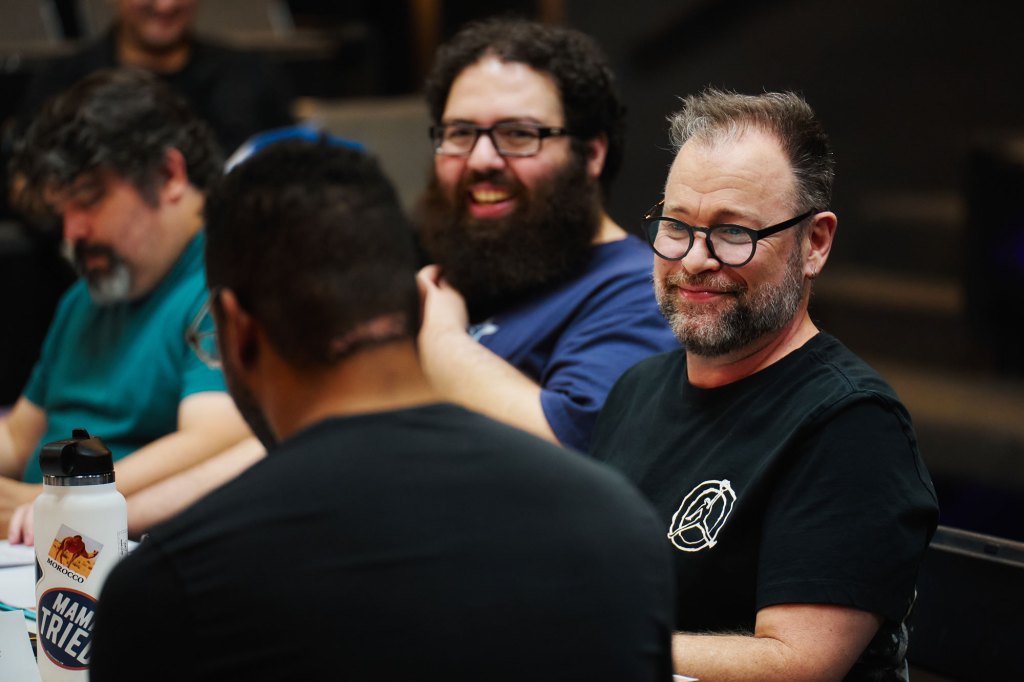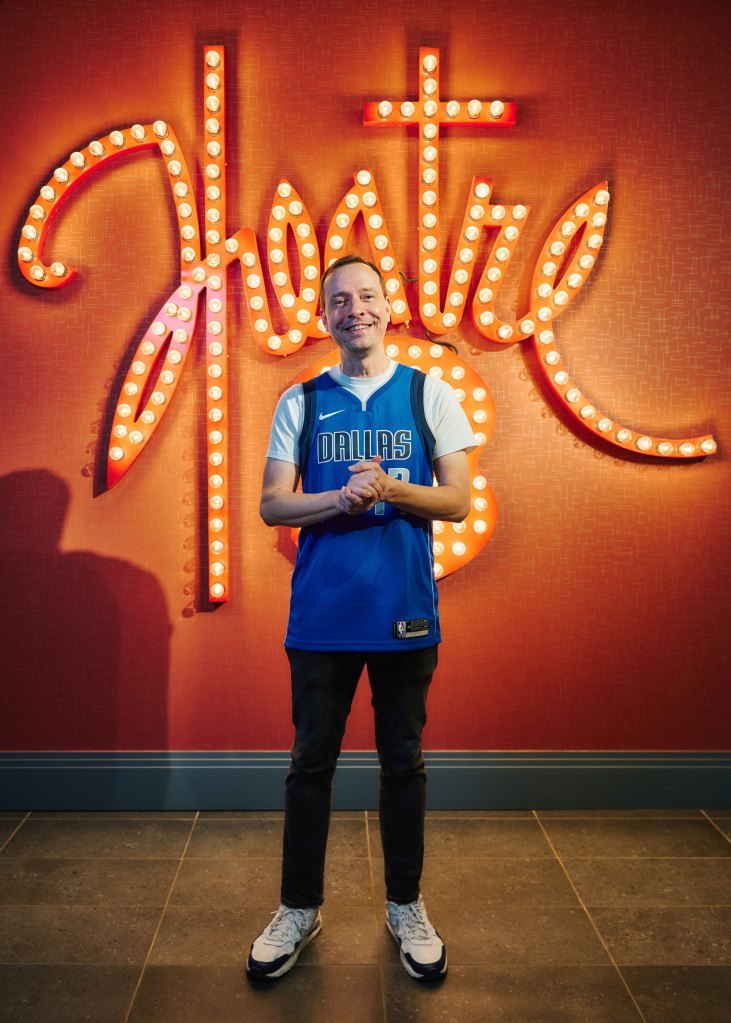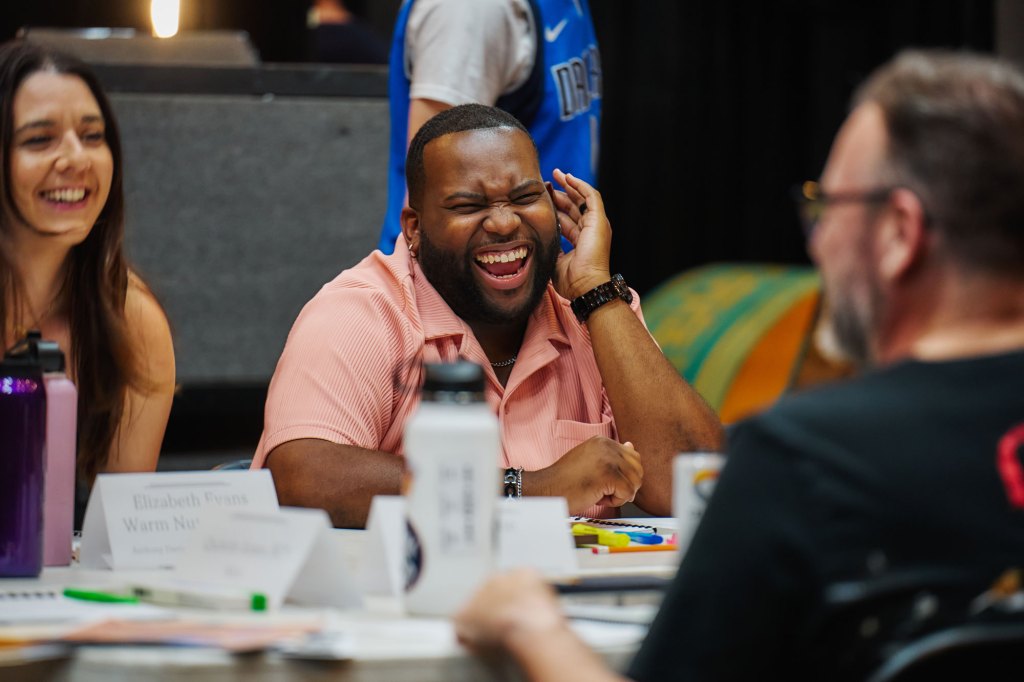
Chris Durbin

Audio By Carbonatix
When Matt Coleman went to sleep on Feb. 1, Luka Doncic was still on the Dallas Mavericks. He woke up to a text from his friend Matt Lyle, plainly reading “What the fuck.”
“I immediately knew it was something to do with the Mavs,” Coleman says. “Matt and I text about a select number of things, and ‘what the fuck’ would only apply to like, one of those things.”
A quick internet search confirmed that his unimaginable fears had become true: point guard Luka Doncic had been traded to the Los Angeles Lakers for Anthony Davis. Coleman and Lyle (or “the two Matts”) were devastated. Both grew up in East Texas – out of broadcast range for Mavericks games – and met in college, where they bonded over their shared place in the Venn diagram of basketball fans and fiction lovers. Lyle has been a playwright for more than 20 years, and Coleman has authored several detective fiction books.
“Our early friendship sort of paralleled with Dirk’s [Nowitzki’s] career,” Coleman says. The German phenom was drafted by the Mavericks in 1998, remaining with the team for two decades until his retirement in 2019.
By the time Doncic was drafted to the team in 2017, aligning with the final year of Nowitzki’s career, it was as if they could be young again.
“It was almost like Luka was Dirk’s avatar,” Lyle says. “Like his son. Like he gave us his only begotten son to continue his legacy.”
“We felt this pride,” Coleman adds. “Like it was our kid.”
Naturally, when news broke about Doncic’s trade, those long-held feelings came with it.

Chris Durbin
“I was pretty devastated,” Lyle says. “I know in the grand scheme of things, this is not the most important thing happening in the world or even my life, but why does it feel like this? Like a death or an ended relationship.”
Their sentiments were shared across the city, resulting in honorary murals painted for Doncic and an in-person protest in downtown Dallas before the team’s first home game after the trade.
Just a few years prior, Coleman and Lyle co-wrote Raptured!, a “sex farce set in an East Texas baptist church” that debuted at Theatre Three in 2019.
“It went really well and we had a lot of fun,” Coleman says. “We talked immediately about doing this again with something. And then God stopped loving us, and we had to make sense of the world.”
Lyle’s gears began to turn. Could the high drama of the Doncic trade translate to an entire stage play? What if it were written through the framework of a centuries-old theatre technique?
“It’s a tragedy,” Lyle says. “But it’s a parody of a Greek tragedy, sort of making fun of how big a deal basketball is and these millionaires [are] going off, having an awesome life. We feel attached to it in some way, like emotional about it.”
Lyle pitched The Trade to Jeffrey Schmidt and Christie Vela, artistic directors at Theatre Three in uptown Dallas. They liked it enough to clear out room on their schedule for the show to run in October, coinciding with the beginning of the NBA season. Soon, Lyle and Coleman got to writing, finishing and casting the production ahead of a tight Oct. 13 deadline. After completing the script and stage design, Lyle began the first day of official rehearsals at Theatre Three on Sept. 16, a speedy turnaround.

Chris Durbin
Playing Six-Man
At around 7 p.m. at the theater, six actors file into the 280-seat auditorium for the first full cast read-through of The Trade.
We first notice Chad Cline, a middle-aged man dressed in a full Mavericks uniform adorned with Doncic’s no. 77. If you’re four drinks in and squinting from a distance, perhaps his tattoos, messy haircut and goofy cadence would pass as Doncic himself. For some, taking the emotionally charged part of Doncic would be a challenge. But for Cline, a career actor who made his stage debut in another sports satire, Damn Yankees, it’s just another day at the office.
He’s been a Mavs fan since the ’80s, and says he got into acting during his senior year of high school when he realized he needed an art credit. More than 30 years later, Cline’s love for the craft hasn’t slowed, although his love for his hometown team might have.
“I was in shock, devastated and really physically ill,” Cline says of the trade. “I didn’t watch any basketball until the finals. I’m an NBA2K guy. I didn’t buy 2K25.”
After photoshoots, Cline sits at a center table alongside the rest of the cast for the first full read-through, and he immediately steals the show. To comedic effect, Cline lays the very best and worst of Doncic fully bare, ranging from criticisms of his weight to his maturity.
“He’s larger than life,” Cline says. “Everybody knows who he is, so I’m really playing him as honestly as I can, being true to the emotion and the playfulness. There’s a lightness to him, too. If you watch him in these games, he’s having fun. So I think having some of that sprinkled in is going to be important.”
Quintin Jones is towering over his peers in a sleek, mint-colored suit. He walks up to a makeshift white background with a noticeably calm friendliness, making a hilarious juxtaposition for what comes next.
“Can you give me ‘I’ve done nothing wrong and I never will,'” beckons a marketing assistant. Jones strikes an apathetic mean mug we’ve only ever seen in howls of player tunnels at American Airlines Center.
That’s right, Jones has been cast in the role of Nico Harrison, Dallas’ Ozymandian prince – the sort of comic book-level, villainous backstabbing you can’t believe exists. If you live in Dallas, you also can’t believe anyone doesn’t share the same resentment toward Harrison. But Jones doesn’t. Not because he’s playing Harrison, but because he just learned who he was.
“I was talking to a bartender at Woody’s,” Jones recalls. “I’m auditioning for this show about Luka getting traded from the Mavericks, and the role I’m auditioning for is this everyman type character, and his name is Nico. He’s like, ‘That’s hilarious. It would be wild if his name was Nico Harrison.’ And I’m like, ‘It is.’ He slapped his forehead with his palm. I completely misread this whole script.”
Jones has been acting on stage since childhood. He debuted as a cake-serving utensil in The Beauty and the Beast and had to convince his friends that he wasn’t an iron. Playing basketball was never on his radar, nor was watching his hometown Mavericks.
“I went back and reread it,” Jones says. “Anytime I thought a character might be made up, I’m just going to look them up. And it turns out, every single character that I thought was made up is a real person, and not only a real person, but a well-known real person.”
Jones is the only member of the six-person cast of The Trade who plays only one character. His five co-stars are each their own one-person ensemble, with character cameos based on nearly everyone involved in the greater NBA and Mavericks universe.
Take it from Jeff Swearingen, the career actor who appears as Mark Cuban and Adam Silver in The Trade, plus a few other surprise parts we won’t spoil here. Swearingen is a Mavs fan and a prolific stage and film actor, first working with Lyle in 2007.
“New works always excite me,” Swearingen says. “More so than doing something that’s done everywhere for the last 60 years or something. This is just like yesterday, and the script is incredibly polished for how new it is.”
Jones agrees.
“Probably my favorite part of doing theater is being involved with new works,” Jones says. “To be involved with a new work centered around an event where the fallout is still a very present, ever-changing thing has been so exciting.”
Swearingen and Jones weren’t the only actors to praise Lyle. Brian Gonzales, a seasoned Broadway actor who plays several minor roles in The Trade, shares similar sentiments.
“He’s very good at mining the comic potential as well as the dramatic potential,” Gonzales says of Lyle. “I was excited to see what he was going to do with the Greek tragedy, and the script I read was hilarious.”
“It was so funny,” Jones adds. “About halfway through, I started getting nervous because I realized I’m going to have to be on stage with these people and not break. Nico can’t break.”

Chris Durbin
Tragedy into Triumph
After attending the first full cast read-through, we can vouch for the laughs this play promises. Without giving too much away, the parody pulls zero punches: Nico, Luka, Cuban — at some point, everyone is the butt of a joke in The Trade. Audiences will likely feel like they have stepped inside a South Park episode set in Dallas.
To that end, the set being constructed for The Trade is unreal, as it transforms Theatre Three’s in-the-round auditorium into a miniature-sized American Airlines Center, complete with player tunnels, concession stands and actual hoops.
“There is an ambition to this,” Gonzales says. “I’ve been involved with things that were ambitious on a foolish level, and then I’ve been part of things that were ambitious on a manageable, or at least whimsical level. The ambition behind this one, I think, is gonna work.”
For some, the ambition behind The Trade goes beyond its over-the-top comedy or biting Dallas satire and toward providing some relief for any of the unhealed wounds since last February. If it’s any solace, even though the Wonder Boy has left the city, the joy The Trade brings proves that in Dallas, there will always be just a bit of “Luka magic” in the air.
“It’s offering the opportunity for some closure and the audience to enjoy the trade,” Cline says. “To not have it be something that sets us behind. Maybe something that pushes us forward, and we can move past the negativity of it and find some joy in Dallas sports again.”
The Trade‘s greatest storytelling strength offers us a chance for collective healing, aided by ways to laugh about it all. What else can we do now, right?
“They’re still processing the feelings,” Swearingen says of Mavs fans. “People have some pretty big feelings about it. I think the most important part is that we’re going to provide a space and a time where we can have that communion of going through this together. We’ll be able to sit in a room and kind of laugh and process all the things that we’re feeling. Misery loves company.”
The Trade opens at Theatre Three on Oct. 9 and runs through Nov. 2.